Gambia Plan – win-win with Africa – the 11th commandment
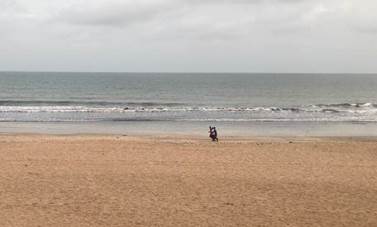

The Gambia in July 2019 – the point of the crocodiles here is … (read to the end)
Dear friends,
Last week ESI visited The Gambia – a young democracy and one of the smallest countries in Africa with around 2 million people – to discuss ways to address the most emotive issues in European politics today: how to prevent migrants drowning in the Mediterranean; how to stop the suffering of migrants in Libyan detention centres; and how to approach deportations of Africans who do not obtain asylum in European countries (many of which reside in Germany, by far the most popular destination country).
I met ministers, parliamentarians, civil society groups and returnees from Libya to discuss a way forward that meets three key objectives:
- It must be a win-win solution for both The Gambia and Germany.
- It must reduce suffering in Libya and deaths at sea.
- It must strengthen, not weaken, the young Gambian democracy and help its youth.
Such a plan is possible. To work it must get the support of majorities in both countries. If adopted and successfully implemented it could become a model for other countries in Europe and in West Africa. Here is how to get there.
Moral realism on deportations
Let us begin with the emotive topic of deportations. This has tens of thousands of Gambians in Europe and hundreds of thousands of their relatives in the Gambia on edge. Let us begin with two key numbers: 10,000 and 144.
10,000 is the number of Gambians in the German state of Baden-Württemberg in 2019 likely to be liable to deportation. 144 is the total number of Gambians who were returned from Germany to The Gambia in 2018.
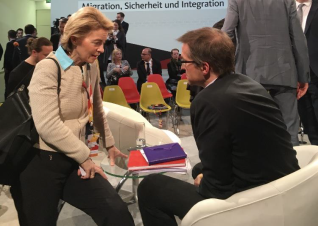

CDU Migration Workshop – Berlin January 2019
When invited to speak at the CDU migration workshop by party leader Annegret Kramp-Karrenbauer in early 2019 I referred to these two numbers. I pointed out that at this rate it would take 69 years to deport only those who are now in Baden-Württemberg. The reality is this: most Gambians now in Germany will stay. What Germany needs, therefore, is a strategy to integrate those who will be here for decades, while controlling future irregular migration.
Afterwards some came to me and said, no, in fact, Germany could simply speed up deportations. I responded that no EU country was returning more people to any African country (per capita). Why would The Gambia accept something that nobody else did? Germany needs realism on returns.
Then, a few weeks later, in February 2019 The Gambia stopped all return operations. This followed popular protests after the return of 20 Gambians, accompanied by 60 German police officers, on a charter plane from Germany. These protests started already on the airport. There was a storm of outrage in social media and on popular radio stations. There were demonstrations throughout the country. There were warnings from parliament and the opposition. There were also rumours that Germany had secretely bribed the government (which it had not). One spokesperson warned the government at protests:
"The last group of 20 deportees that arrived at the Banjul International Airport in February were cuffed and had their legs shackled from Germany to The Gambia ... This is very shameful. We are no longer in the time of slavery. We will not tolerate such things anymore."
In fact, nobody in Germany is seriously planning to return thousands of Gambians by plane. One small charter costs more than 70,000 Euros. To talk about large-scale deportations is a bluff, but one that leaves hundreds of thousands of people in The Gambia, with relatives in the EU, extremely nervous about any one forced return.
Since then German and EU delegations have pressured the Gambian government to end the moratorium on return flights. To no avail. A recent visit by an EU delegation to Banjul, the Gambian capital, in May 2019 ended without agreement. What the European Commission wanted it described in an internal paper:
"2 non-scheduled flights per month, with maximum 20 returnees per flight, for the first 3 months; 4 non-scheduled flights per month, with a maximum 25 returnees per flight, after the first 3 months. There should be no more than 1 non-scheduled flight per week." (Commission report, Banjul 2-3 May 2019)
In short, the European Commission was trying to get the Gambian government to allow more than 1,000 returns of its citizens in a year, for many years to come. In return it offered to send a consultant to help the Gambian government "effectively communicate with its citizens", as well as "to monitor developments in the (social) media."
This would turn a small young democracy into the top return destination in Africa, threatening its political stability. The Gambian government could not and did not accept this. No government in West Africa has ever accepted anything similar.
The European Commission knows that such demands will not be accepted. Why does it apply useless pressure? Now some in Brussels are even talking about visa bans on The Gambia; this in a country where not a single (!) EU embassy gives Schengen visa today – and people need to travel all the way to Dakar in Senegal, a very long and expensive journey.
Note also that the breakdown in deportations is not because the Gambian government has not been cooperative. In fact, no other country in Africa was as cooperative as The Gambia in 2018:
- In April 2018 the government sent a Note Verbal, accepting the EU's Text on Good Practices for the Efficient Operation of the Return Procedure.
- In May 2018 the Delegation of the European Union wrote back to the Gambian Ministry of Foreign Affairs noting that "implementation of the Good Practices will start after a grace period, on 16 November 2018."
- Then the European Union and its member states ignored this "grace period." A charter from Germany in August 2018 brought 15 people. There were also deportations organised by Frontex. This undermined trust: between Banjul and Brussels, and between Gambian citizens and their government.
- In total 31 Gambians returned from Germany in 2017. In 2018 it was 144. In the first few weeks of 2019, until the moratorium in February, it was 37. Then everything stopped … until today. Now there is silence, tension and great nervousness among the diaspora and their families.
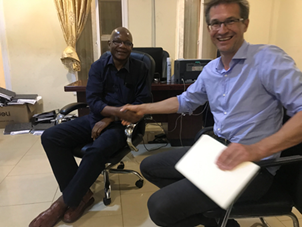
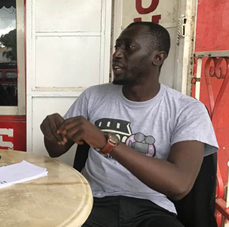
Policy needs support: the Gambian Minister of Youth – the leader of Gambia National Youth Council
The view from Berlin – and from Banjul
How could things go so wrong? This was mostly due to a lack of realism. It was also a result of a lack of clear communication. Let us begin, then, with two very different views which need to be reconciled.
The view from Germany:
Those to be returned are Gambians whose asylum claims have been rejected after a long procedure. Following a transition in early 2017 Gambia is no longer a dictatorship with massive human rights violations under an autocratic ruler, as it had been for 22 years: it is a democracy. There is freedom of speech, a democratic parliament, even a truth commission openly investigating crimes of the state.
In recent years Germany has given more international protection to refugees than any other industrial country in the world (more than 1 million people have received refugee status and subsidiary protection since 2013, compared to less than 150,000 in Italy in the same period). Also, in 2018 less than 5 percent of Gambians received refugee status or subsidiary protection in Germany.
Today leaders of all German mainstream parties, from Chancellor Merkel to the leaders of the Green Party, agree that those who do not get protection should return. This is the law, national and international, German officials insist. So why shouldn't Gambians be returned?
The view from Banjul:
144 returns in 2018 may seem like a small number to officials in Germany. For Gambia it was enough to turn deportations into an issue threatening social and political stability. No other issue is as emotive in this small nation.
In the past five years an unprecedented number of Gambian citizens left their country to try to reach the European Union. With a population of 2.2 million, the departure of more than 46,000 citizens since 2012 amounts to more than 2 percent of the total population. This is one in fifty Gambians.
Irregular arrivals of Gambians in the EU (Frontex)
|
Year |
Arrivals |
|
2009 |
262 |
|
2010 |
140 |
|
2011 |
599 |
|
2012 |
553 |
|
2013 |
2,817 |
|
2014 |
8,725 |
|
2015 |
8,874 |
|
2016 |
14,510 |
|
2017 |
8,522 |
|
2018 |
2,780 |
A large majority of Gambians heading to Europe took the most dangerous possible route, through Niger, the Sahara, Libya and across the Central Mediterranean.
Nobody knows how many people died along that route, but the number was certainly horrendous: first in the Sahara, then in Libya, and finally at sea. What is known is that more than 2 percent of all people who crossed the Mediterranean in those years drowned.
This would yield an estimate of almost 1,000 Gambians who lost their lives at sea in this period. This is equivalent to more than 37,000 German deaths by drowning in a few years. These are the kind of casualty numbers one associates with a war.
When people started leaving in large numbers, The Gambia still suffered from a decades-long dictatorship and serious human rights abuses. Families and communities raised huge sums of money for these trips and went into debt. Some took on more debt later to liberate their children from Libyan traffickers. And while a huge number died – at sea, in Libya, in the Sahara – many more suffered horrendously in Libyan detention before making their way to Europe. This includes children of government ministers. It is a national trauma. Returns, even of very few, cannot pass unnoticed: each one signals that the effort, and the suffering, was for nothing. Emotions are easily stirred.
The national priority of Gambian democrats today is to consolidate their young democracy and to lay a foundation for sustainable development, in a nation which has been isolated for decades, is among the poorest in the world and where the average age is just 17. And where, today, a military mission funded by the EU with soldiers from the ECOWAS (the Economic Community of West African States) is still present to preserve stability. No responsible Gambian politician would risk this stability just to please the EU.
How can these two views be reconciled? By looking at the facts.
Contrary to the impression in Berlin, no other county in Africa has been as cooperative as The Gambia in 2018: not Morocco, not Tunisia, not Ghana or Senegal. 144 returns in one year has been the highest number of deportations from Germany to any African country per capita! All these countries are important, some even priority countries, for German development cooperation. But in The Gambia today there is not a single bilateral German project. So far Berlin has expected more from Banjul, and offered less, than to any other country in Africa.
2018 – all deportations by plane from Germany
|
Persons |
Percent |
|
|
EU/Schengen countries |
7,947 |
38% |
|
Western Balkan countries |
6,296 |
30% |
|
North African countries |
1,696 |
8% |
|
- Morocco |
722 |
|
|
- Algeria |
567 |
|
|
- Tunesia |
344 |
|
|
- Egypt |
63 |
|
|
Georgia, Moldova, Ukraine |
1,675 |
8% |
|
Rest of the world |
3,445 |
16% |
|
- Russia |
422 |
|
|
- Pakistan |
367 |
|
|
- Armenia |
345 |
|
|
- Afghanistan |
283 |
|
|
- Turkey |
277 |
|
|
- Azerbaidjan |
213 |
|
|
- India |
212 |
|
|
- Ghana |
210 |
|
|
- Nigeria |
195 |
|
|
- Gambia |
144 |
|
|
- Bangladesh |
123 |
|
|
- China |
48 |
|
|
- Belarus |
37 |
|
|
- Irak |
35 |
|
|
- Iran |
22 |
|
|
- Senegal |
16 |
|
|
- Guinea |
16 |
|
|
- Cote d'Ivoire |
5 |
|
|
- Togo |
5 |
|
|
- D.R. Kongo |
4 |
|
|
- Other countries |
466 |
|
|
TOTAL |
21,059 |
100% |
Deutscher Bundestag, Abschiebungen und Ausreisen im Jahr 2018, Antwort der Bundesregierung auf eine Kleine Anfrage der Linken, 26 February 2019.
All this was not due to the failure of a strategy but to the absence of one. There was a lack of diplomacy. This can be remedied.
Stuttgart to the rescue
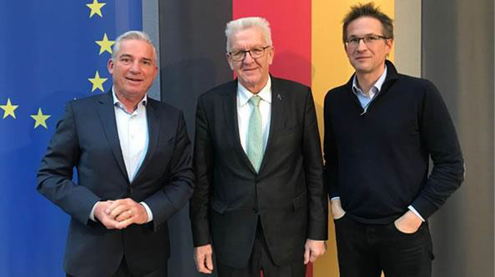
Discussing returns with the government of Baden-Württemberg (January 2019)
Thomas Strobl, minister of the interior and Winfried Kretschmann, prime minister
Most Gambians in Germany today are resident in the state of Baden-Württemberg, which has 11 million inhabitants. Baden-Württemberg is one of the richest regions in the world. It has its own constitution, prime minister and parliament.
It is in Stuttgart that the key decisions for returns and integration of most Gambians in Germany are taken as it is state (Länder) governments that determine when and how deportations take place.
The government in Stuttgart is a Green-CDU (Christian Democrat) coalition. Its prime minister, Winfried Kretschmann, is from the Green Party and, according to recent polls, the most popular leader of a Land (state) in all Germany. The deputyy prime minister and minister of interior, Thomas Strobl, is also deputy leader of Angela Merkel's CDU.
In December 2018 the government in Stuttgart published a paper on its refugee policy. It is an impressive list of achievements, including the resettlement of 1,100 Yazidi women and children from Iraq.
It also refers to some 2,600 Gambians required to leave Baden-Württemberg, and to another 6,000 with pending asylum claims, the vast majority of which likely to be rejected soon. More have since arrived from Italy, so today there may well be an estimated 10,000 Gambians potentially subject to return. The paper refers to plans to return around 15 Gambians a month. This would be 180 a year. But even this proved impossible in the absence of addressing Gambian concerns seriously. Note that at this moment neither Spain nor Italy even attempt deportations to The Gambia.
However, the government of Baden-Württemberg could decide to embrace a realistic policy that does not promise mass returns which can never be realised. It could promise as part of an agreement – contained in a public declaration – with The Gambia:
- not to deport law-abiding Gambians who do not pose any threat in the next three years.
- to make even more efforts to support Gambians in Baden-Württemberg to acquire the skills needed to integrate and contribute to its economy, as many already do throughout the state. If they then return in a few years time they would do so with capital and skills and would also benefit their country and families.
In return the government in Banjul could offer the following in such a declaration:
- to communicate to the diaspora in Germany that it must make every effort to get skills, learn, and work, so as to build a bridge between The Gambia and one of the most developed parts of the world.
- to communicate clearly that anyone sentenced to crimes would be deported and quickly accepted by Banjul.
- to announce that The Gambia would also help identify and take back any of its citizens arriving irregularly in Germany after the date of the joint declaration with no right to stay. The goal would be to stop future irregular migration.
- to help identify and give documents to all Gambians in Germany, now without fear that this could lead to deportations.
- to agree on a roadmap for The Gambia to become a safe country of origin by summer 2020. Senegal already is such a safe country for Germany. This would allow Germany to accelerate asylum procedures. This would also be a strong signal to investors and tourists that in The Gambia human rights will be taken seriously.
Such a declaration would have a huge calming effect on thousands in the diaspora, and on tens of thousands of relatives in The Gambia. It would acknowledge that the fates of Stuttgart and Banjul will remain linked. Baden-Württemberg and The Gambia would thus recognize a joint interest in the success of both the diaspora in Germany and of democracy and development in The Gambia. In this way both would win.
At the same time the German government should consider The Gambia a priority country for its development cooperation. It should open avenues for legal migration, linked to skills training in The Gambia, and expand scholarship and exchange options. It should consider opening an embassy and issuing Schengen visas in Banjul, so the costly long trip to Dakar would no longer be needed. And it should reach out to other European governments, such as Spain, to join such a declaration.
The best outcome would be a commitment by The Gambia to take back anyone who crosses the Mediterranean irregularly after an agreed date. For this to work would require cooperation between a coalition of countries, best led by Germany and Spain.
The goals: to replace dangerous irregular migration with regular migration. To lay a foundation for a new approach to returns and development. To take a small but crucial step towards humane borders, control and cooperation. And to set a model for other countries: instead of sterile stand-offs, setting out a joint vision of a better future.
The Gambia is also small enough for the German initiative outlined in the Marshall Plan with Africa of development minister Gerd Müller to make a visible impact. And as an emerging democracy it deserves such support all the more. A new relationship between The Gambia and Baden-Württemberg and between The Gambia and Germany would turn The Gambia into a pioneer in West Africa.
Rescues, returns and the 11th Commandment
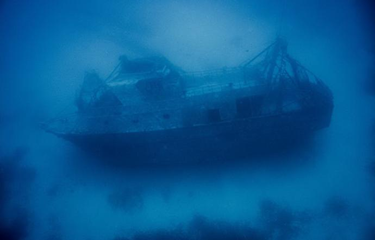
The deadly lack of a strategy: migrant boat on the bottom of the sea
Nobody in The Gambia wants a return to the tragedy of recent years, when tens of thousands were captured and mistreated in Libya and huge numbers died on the "backway" to Europe.
Proposing an alternative way forward is all the more important at a time of deeply confused debates on sea rescues across Europe. Today some argue that the best response to irregular arrivals from Libya is to hinder sea rescues. Others argue the opposite: to reduce the number of people drowning send more rescues boats. This is part of a deeply confused debate over pull and push factors.
In fact, leaving ideology aside, the facts are clear. Once many young Gambians reached Europe after 2014 and sent pictures of themselves in Italy or Germany, many others set out to follow them. As more entered lawless Libya, more were tortured and mistreated by criminals. And if many people get into rubber boats and set out for Italy, many people drown.
The only way to reduce deaths is to stop people setting out in boats. The only humane way of doing so is neither by stopping rescues nor by returning people to face torture in Libya – both of which are illegal and immoral – but by returning them to their countries of origin quickly, if they do not need protection. This would sharply reduce arrivals, but it can only be done in cooperation with countries of origin. These must be offered something in return. Something like this Gambia Plan.
There is in fact an eleventh commandment: Thou shalt rescue people at sea. No civilised person can seriously argue against rescuing people who might be saved. However, no serious observer of the Mediterranean in recent years can seriously believe that more rescues boats alone will lead to fewer deaths. The times of most rescues (during Mare Nostrum in 2014, during the massive international rescue effort in 2016) were the times of most drownings. The deadliest periods were those when most people were rescued.
We need to rescue, we should support rescue boats and at the same time we must not turn Europe into a deadly magnet for young Africans. This requires going beyond vague talk about "legal ways." It requires real agreements. A breakthrough between Germany and The Gambia today could show the way to a new European policy. Such a policy will not emerge all at once. It must be build step by step on interests, values and trust.
We need empathy, but empathy alone is not enough. What Europe needs today is a strategy. Action, not words. Some going ahead, proving what can be done. If Baden-Württemberg and The Gambia can show the way they would help everyone else.
Yours sincerely,

Gerald Knaus
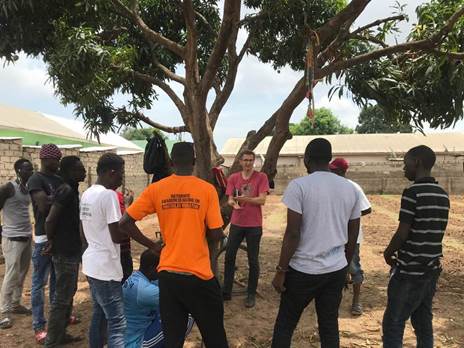
Debate with returnees from Libyan detention centres in The Gambia
Since mid-2017 IOM has helped more than 4,000 Gambians return home from Libya. The organisation YAIM (Youth against irregular migration), created by people formerly detained in Libya, is warning their compatriots against the dangers of irregular migration. Such returnees should receive support, and their fellow Gambians should be offered a clear signal that their country has a future and is not abandoned.
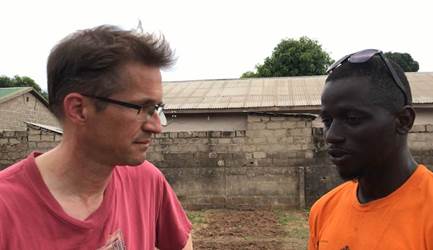
With Mustapha Sallah, the general secretary of YAIM
(Youth Against Irregular Migration)
Finally: what was the point of the crocodiles at the beginning of this newsletter? Actually, it was to catch your attention, while making a simple point in passing: Gambia is well worth a visit. Already today no other country in Africa depends as much on tourism in its GDP. With the right support, skills and focus on eco-tourism it could become a West African Costa Rica.
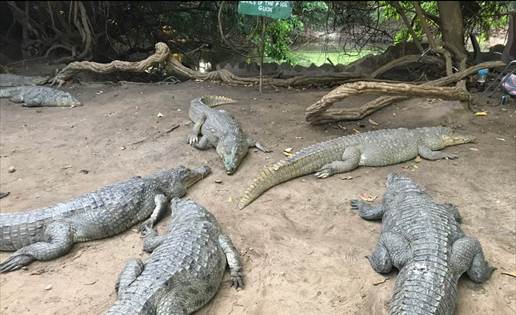
Creatures in a sacred pond near Banjul, waiting to be touched
For more on developments concerning rescues and The Gambia in the coming weeks please check my twitter account (@rumeliobserver) and go to www.rumeliobserver.eu.
ESI on rescues and migration in 2019
The Washington Post, Claire Parker, "When Italy closed its ports to migrants, tiny Malta took them instead. With conditions." (9 July 2019)
Italy often conducted sea rescues but since Salvini’s term began, “there’s been a real shift,” said Gerald Knaus, the founding chairman of the European Stability Initiative. … When he closed the ports, he dramatically increased the pressure on Malta. But everybody in Europe knows that Malta cannot be the place where you can disembark people to stay in large numbers … At the moment, it’s a crisis every single time. And that’s not sustainable. It’s like a Greek tragedy and you already know the end.”
ARD (German national TV), "Bericht aus Berlin" - TV interview with Gerald Knaus - ("Report from Berlin") (8 July 2019)
Frankfurter Allgemeine Zeitung, "In den Fängen der Schleuser" ("In the hands of traffickers") (3 July 2019)
ZDF (German national TV), "heute+" - TV interview with Gerald Knaus - (1 July 2019)
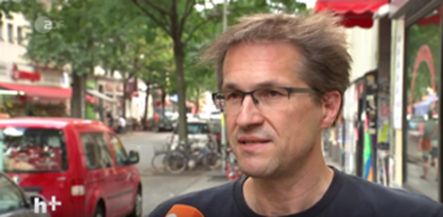
ZDF TV interview on the importance of private sea rescue missions in the Mediterranean
ARD, "Tagesthemen" - TV interview with Gerald Knaus - (1 July 2019)
The Wall Street Journal, Bojan Pancevski, "Steady Flow of Refugees Fuels Nationalist Gains in Europe" (30 April 2019)
El País, Gerald Knaus, "Una política fronteriza humanitaria es posible en Europa" ("A humanitarian border policy is possible") (29 April 2019)
ZDF, Heute Journal, "Kritik an Seehofers Gesetzentwurf" - TV interview with Gerald Knaus - ("Criticism of Seehofer's draft law") (12 April 2019)
ARD, Tagesschau, "Das müsste jeden Europäer beschämen" - interview with Gerald Knaus - ("Every European should be ashamed") (28 March 2019)
Frankfurter Allgemeine Zeitung, Larissa Volkenborn, "Das Gerede von einer drohenden Invasion aus dem Süden ist Unsinn" - interview with Gerald Knaus - ("The chatter about a looming invasion from the south is nonsense") (12 February 2019)
SRF (Swiss national TV), "Krise mit Seerettern vor Malta - 'Wir müssen und können das absurde System ändern'" - interview with Gerald Knaus - (8 January 2019)
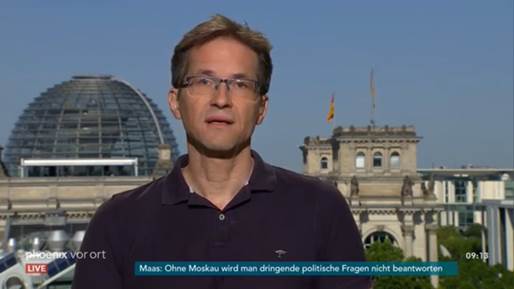
ESI in the media in July 2019
Frankfurter Allgemeine Zeitung, Thomas Jansen, "Bedeuten mehr Retter auch mehr Migranten?" ("Do more rescuers mean more migrants?") (22 July 2019)
ORF, "'Praktikable Lösung' für Seerettung im Mittelmeer erwartet" ("'Feasible solution' for sea rescues in the Mediterranean expected") (19 July 2019)
Kurier, "Zu sagen, es geht um Hunderttausende, ist ein großer Fehler der NGOs" ("It is a big mistake by NGOs to say that it is about hundreds of thousands") (19 July 2019)
Ö1, Morgenjournal, "Keine EU-Einigung zum Umgang mit Bootsflüchtlingen" - radio interview with Gerald Knaus - ("No agreement on how to deal with boat refugees") (19 July 2019)
Der Spiegel, "Der endlose Streit über die Seenotrettung" ("The endless fight over sea rescues") (19 July 2019)
Süddeutsche Zeitung, Moritz Baumstieger, "Geld alleine reicht nicht" ("Money alone is not enough") (19 July 2019)
Phoenix, "Seenotrettung: Interview mit Gerald Knaus (Denkfabrik Europ. Stabilitätsinitiative)" - TV interview - ("Sea rescues: Interview with Gerald Knaus (think tank European Stability Initiative)") (18 July 2019)
radioeins, "Seenotrettung und Migration" - radio interview with Gerald Knaus - ("Sea rescues and migration") (18 July 2019)
Süddeutsche Zeitung, Axel Hacke, "Werde auch du ein Salvini" ("You can become a Salvini, too") (18 July 2019)
NRC Handelsblad, Caroline de Gruyter, "EU verschuilt zich achter boeman Salvini" ("EU is hiding behind the bogeyman Salvini") (16 July 2019)
Süddeutsche Zeitung, Thomas Kirchner, "In der Migrationspolitik hat die EU zwei grobe Fehler gemacht" ("The EU has made two serious mistakes in its migration policy") (15 July 2019)
Südkurier, Angelika Wohlfrom, "Wie lange wollen wir noch dabei zusehen, wie Menschen im Mittelmeer sterben?" ("How much longer do want to watch people drowning in the Mediterranean") (14 July 2019)
Deutschlandfunk, Gudula Geuther, "Ein pragmatischer Ansatz in der Seenotrettung" ("A pragmatic approach to sea rescues") (13 July 2019)
BR, Quer, "Bayerns Seenotretter und die 'große Politik'" - TV interview with Gerald Knaus - ("Bavaria's sea rescuers and 'high politics'") (11 July 2019)
jetzt, Sophie Aschenbrenner, "Die Gefahr einer Masseninvasion aus Afrika ist ein Mythos" - interview with Gerald Knaus - ("The danger of mass invasion from Africa is a myth") (10 July 2019)
Merkur, Sebastian Horsch, "Misere im Mittelmeer: Vater des Flüchtlingsdeals hat Forderung an Merkel" ("Plight in the Mediterranean: The architect of the refugee deal has demands for Merkel") (10 July 2019)
WDR, Morgenecho, "Seenotrettung: 'Vornehmlich eine deutsche Geschichte'" - radio interview with Gerald Knaus - ("Sea rescues: 'Primarily a German story'") (9 July 2019)
The Washington Post, Claire Parker, "When Italy closed its ports to migrants, tiny Malta took them instead. With conditions." (9 July 2019)
t-online, Johannes Bebermeier, "Migration nach Europa - Was man Angela Merkel vorwerfen kann" ("Migration to Europe - What Angela Merkel can be accused of") (9 July 2019)
RTL, Aktuell, "Gerettet und jetzt?" - TV interview with Gerald Knaus - ("Rescued and now?") (9 July 2019)
NDR, Stefan Schlag, "Umgang mit Flüchtlingsschiffen: 'Kein vernünftiges System'" - radio interview with Gerald Knaus - ("How to deal with refugee ships: 'No sensible system'") (8 July 2019)
ORF, ZIB2, "Migrationsexperte Knaus zur Seenotrettung im Mittelmeer" ("Migration expert Knaus on sea rescues in the Mediterranean ") (8 July 2019)
ARD, "Bericht aus Berlin" - TV interview with Gerald Knaus - ("Report from Berlin") (8 July 2019)
Inforadio, "EU-Flüchtlingsrettung: 'Es braucht verbindliche Zusagen'" - radio interview with Gerald Knaus - ("EU refugee rescues: 'We need binding commitments'") (8 July 2019)
BR2, Tagesgespräch, "Flüchtlinge in Seenot: Brauchen wir eine internationale Rettungsaktion?" ("Refugees in distress at sea: do we need an international rescue effort?") (8 July 2019)
Servus TV, "Streit um Flüchtlingsschiffe" - TV interview with Gerald Knaus - ("Controversy over refugee ships") (7 July 2019)
Deutschlandfunk, Dirk-Oliver Heckmann, "Wir müssen es tatsächlich europäisch lösen" ("We actually need a European solution") (6 July 2019)
Neue Zürcher Zeitung, Markus Bernath, "'Uns fehlt nicht Empathie, uns fehlt eine Strategie', sagt Migrationsexperte Gerald Knaus" ("'We are not lacking empathy, we are lacking strategy', says migration expert Gerald Knaus") (6 July 2019)
Der Spiegel, Peter Luley, "llner-Talk über Europa - 'Das können Sie doch Ihrem Friseur erzählen"" ("TV talk on Europe - 'You can tell that to your hairdresser'") (5 July 2019)
Frankfurter Rundschau, Daland Segler, "Maybrit Illner: Migration als Gretchenfrage" ("Maybrit Illner: Migration is the vital question") (5 July 2019)
Berliner Morgenpost, Fabian Hartmann, "Bei Illner platzte Martin Schulz schon am Anfang der Kragen" ("Martin Schulz in rage right at the beginning of TV talk") (5 July 2019)
Der Spiegel, "Der Fall Rackete und die Flüchtlingspolitik - Heldin und Hassfigur" - also available in English : A Heroine and a Figure of Hate - Carola Rackete and Europe's Troubling Refugee Policies - (5 July 2019)
FES Southeast Europe, Adnan Cerimagic, "The EU and the Western Balkans: the erosion of trust and the way forward" (4 July 2019)
Phoenix, phoenix runde, "Flucht übers Mittelmeer – Kann Hilfe Grenzen haben?" - Gerald Knaus in TV debate on sea rescues - ("Flight across the Mediterranean - are there limits to rescues?") (4 July 2019)
ZDF, Maybritt Illner, "Scherbenhaufen Europa – Krise von Brüssel bis Berlin?" - Gerald Knaus in TV debate on sea rescues - ("Europe in shambles – crisis from Brussels to Berlin?") (4 July 2019)
Al Jazeera, James Reinl, "Libya attack revives calls for closing migrant detention centres" (4 July 2019)
Die Welt, Ricarda Breyton, "Wir brauchen Abschiebungsrealismus" - interview with Gerald Knaus - ("We need deportation realism") (3 July 2019)
Frankfurter Allgemeine Zeitung, "In den Fängen der Schleuser" ("In the hands of traffickers") (3 July 2019)
taz, Jan Federssen, "Wasser auf Salvinis Mühlen" ("Grist to the mill for Salvini") (2 July 2019)
Libération, Johanna Luyssen, "Carola Rackete, louée en Allemagne, accusée en Italie" ("Carola Rackete, praised in Germany, indicted in Italy") (2 July 2019)
Deutschlandfunk, Jörg Münchenberg, "Ohne Unterstützung von Staaten ist Seenotrettung auf Dauer nicht möglich" - interview with Gerald Knaus - ("Without state support, sea rescues won't be possible in the long run") (1 July 2019)
ARD, Tagesschau, "Solidarität allein reicht nicht" - TV interview with Gerald Knaus - ("Solidarity alone is not enough") (1 July 2019)
The Washington Post, Rick Noack, "'Hero' or 'pirate'? Arrest of German captain who rescued 53 migrants divides Europe" (1 July 2019)
ZDF, "heute+" - TV interview with Gerald Knaus - (1 July 2019)
ARD, "Tagesthemen" - TV interview with Gerald Knaus - (1 July 2019)

